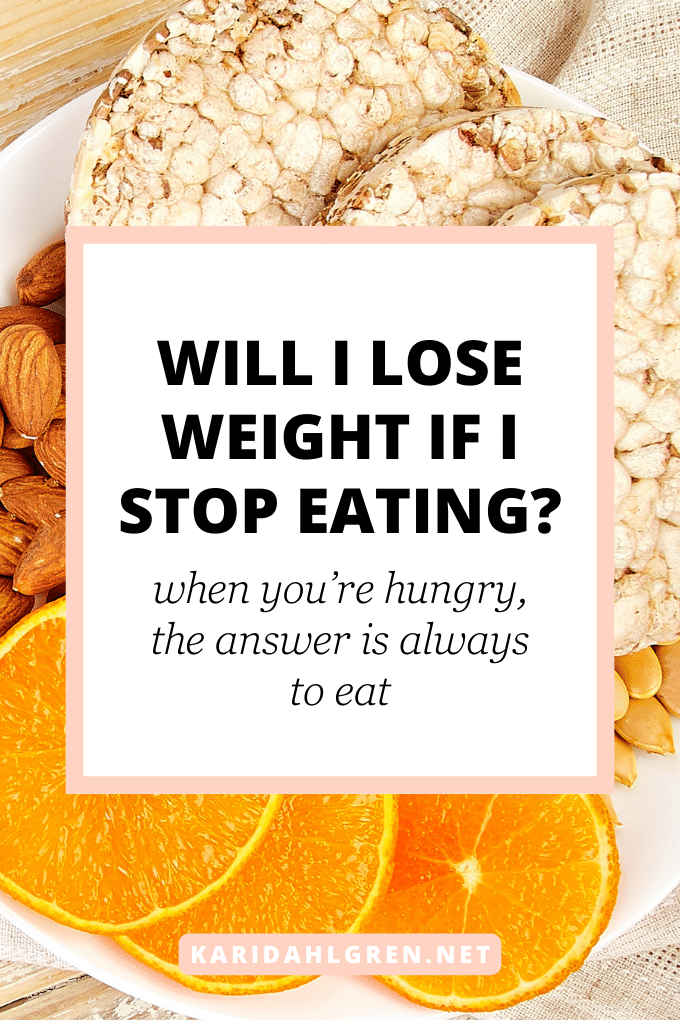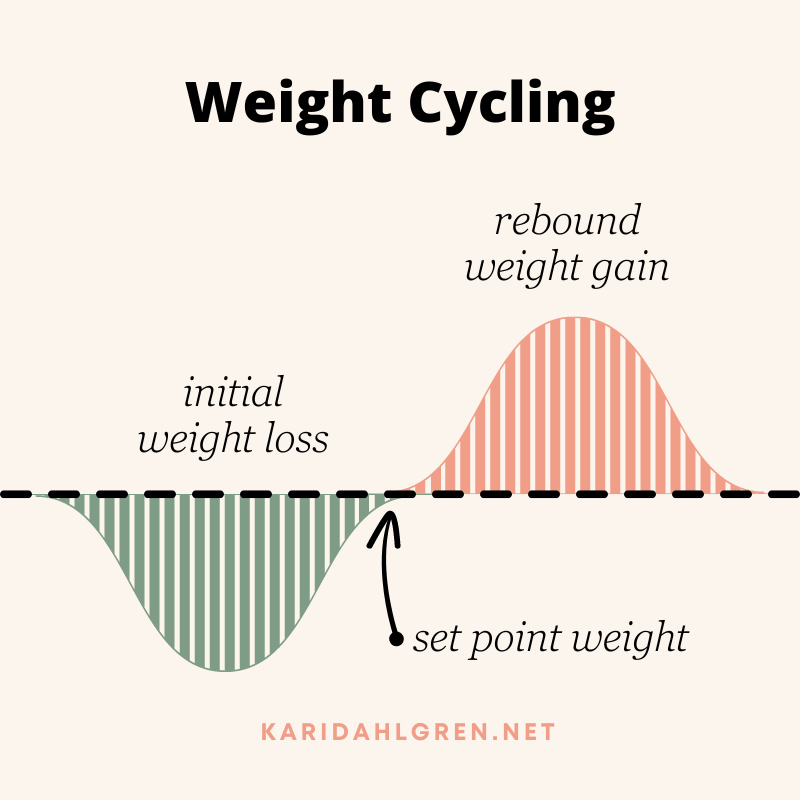
In today’s fast-paced world, the desire for quick weight loss solutions is ever-present. One question that emerges from our diet-centric culture is, “Will I lose weight if I stop eating?” While it’s understandable to seek rapid results, it’s crucial to approach fasting with an abundance of caution and instead focus on a balanced diet.
Be sure to consult with a healthcare professional if you’re considering skipping meals or fasting for health reasons, as it’s not safe for everyone, especially those with an eating disorder. If you’re motivated to stop eating because of depression or body dissatisfaction, it’s very important to get support from a mental health professional too. The National Depression Hotline has 24/7 support if you feel like you’re in crisis.
If you’re asking the question, “Will I lose weight if I stop eating?” this article has the evidence-based answers you’re looking for. We’ll cover the biological consequences of fasting and at the end, you’ll discover tips for managing your weight without the need to skip meals or fast at all.
Will I Lose Weight If I Stop Eating? Why Starvation Is Often Followed by Weight Gain
When considering the question, “If I stop eating will I lose weight?” it’s crucial to understand the body’s complex response to starvation. Initially, you might see a drop in weight but it’s not straightforward nor is it long-lasting for most people.
When the body is deprived of food, it begins to slow down metabolism as a protective measure to conserve energy.[1], [2] This metabolic adaptation means that the body becomes more efficient at using the limited energy it has, making it increasingly difficult to lose weight over time.[3]
In the face of limited energy, the body resorts to burning stored fat for fuel after its primary energy source, glycogen—a form of carbohydrate stored in muscles—is used up. While this may provide hope for rapid weight loss, the body’s fat-burning mechanism is a response to starvation, which means it comes with consequences, including weight regain and sometimes even “overshooting” baseline weight.[4]
In addition to burning fat and slowing metabolism, the body also shifts to burning muscle tissue for energy. A loss of muscle mass can further decrease your metabolic rate, making it even harder to lose weight in the long term.[5] Furthermore, the loss of muscle tissue can have negative effects on overall health and physical function.
Reasons to Avoid Fasting: Set Point Weight Theory
The question, “Will I lose weight if I stop eating?” can also be answered through set point weight theory, which suggests that the body has a natural weight range that it rigorously defends. When eating is restricted, the body employs biological adaptations to encourage eating such as producing more ghrelin, the “hunger hormone,” and reducing leptin, one of the “fullness hormones.”[6]
To illustrate set point weight theory in the context of not eating, let’s look at a study that followed a group of Gambian women who routinely experienced food scarcity. Despite ten years of hungry seasons, their minimal body weight remained within a 3-4 pound range, illustrating how rigorously the body maintains its set point weight.[7] This goes to show that if you stop eating, you may lose weight but your body will work hard to get back to where it was.
When someone decides to stop eating, it may lead to initial weight loss, but it also sets off a cascade of biological adaptations designed to protect the body from starvation. These adaptations include a slower metabolism, increased cravings for high-calorie foods, and a shift to burning muscle tissue for energy, all of which can lead to weight regain.
For those familiar with the benefits of intermittent fasting, all of this information may come as a surprise—so let’s dive into that next.
But Doesn’t Intermittent Fasting Help with Weight Loss?

Intermittent fasting is an eating pattern that cycles between periods of fasting and eating. Common patterns include the 16/8 method (fasting for 16 hours and eating within an 8-hour window), the 5:2 method (eating normally for five days and significantly reducing calories for two non-consecutive days), and alternate-day fasting. Weight lost through intermittent fasting is largely due to reduced caloric intake during fasting periods.
The extremely restrictive methods of intermittent fasting that eliminate eating for an entire day may spark the question: “Will I lose weight if I stop eating?” It’s crucial to approach intermittent fasting with an abundance of caution and never fast for consecutive days. Furthermore, you may want to avoid fasting altogether if you’re only pursuing it for weight loss.
On one hand, intermittent fasting does seem to help with weight loss initially. Twenty seven clinical trials have shown that intermittent fasting helps with weight loss in obese individuals, with some studies showing improved glycemic control, especially in patients with type 2 diabetes.[8] However, these studies were often short-term (2-26 weeks) and small in scale—with the longest studies lasting only one year.[8]
However, there also strong clinical evidence that weight loss achieved through caloric restriction often leads to weight regain over the long term.[9], [10], [11], [12], [13] When someone constantly loses and gains weight, it’s called “weight cycling,” and it has harmful effects on cardiometabolic health.[14]
Weight cycling is almost inevitable with restriction-based dieting like intermittent fasting. For example, one study found that dieters tend to regain at least one-third to two-thirds of the weight lost within a year, and almost all weight is regained within five years.[15] Furthermore, one third of dieters end up not just regaining weight but exceeding their baseline weight and weighing more than before.[15]
While intermittent fasting shows promise for short-term weight loss and may improve certain health markers, its long-term effectiveness remains uncertain. Anyone considering intermittent fasting or expressing curiosity over the question, “Will you lose weight if you stop eating?” should proceed with an abundance of caution and seek guidance from a healthcare professional.
Avoiding the Consequences of Not Eating
Before we dive into alternative methods for maintaining a healthy, stable weight without the need to go long periods of time without eating, let’s review some of the consequences of starvation to emphasize the importance of regular, balanced meals.
Physical Consequences of Starvation
Starvation can lead to a multitude of physical health risks that can have severe and long-lasting effects on the body:
- Nutrient Deficiencies: Prolonged lack of food can lead to deficiencies in essential vitamins and minerals, which can result in anemia, weakened bones, and impaired nerve function.
- Heightened Cravings: Starvation also triggers cravings for carbohydrates as the body seeks to replenish glycogen stores.[16] When you stop eating for long periods of time, it also increases cravings for hyperpalatable foods—those high in sugar, fat, and salt.[17] These cravings ultimately encourage weight regain.
- Weakened Immune System: A lack of nutrients can compromise the immune system, making the body more susceptible to infections and illnesses. While intermittent fasting is associated with improved immunity[18], starvation (which is of central focus with the question, “Will I lose weight if I stop eating?”) is linked to decreased immunity.[19]
- Organ Damage: Starvation can cause damage to vital organs, particularly the heart and brain, due to the body’s need to use its own tissues for energy. This is one of many reasons why an abundance of caution and professional help is necessary if someone is considering fasting.
- Hormonal Imbalances: Starvation can disrupt the balance of hormones in the body, leading to issues with metabolism, reproductive health, and stress response.
- Weight Regain: As previously discussed, the body deploys biological adaptations to starvation to increase hunger, motivate eating, and maintain its set point weight. If initial weight loss occurs, long-term weight gain is likely.
Psychological and Emotional Effects
The impact of starvation is not limited to physical health; it can also have profound psychological and emotional consequences:
- Mood Changes, Irritability, and Depression: The stress of starvation can lead to mood swings, irritability, and even depression, as the body and brain struggle to function without proper nutrition.
- Increased Risk of Developing Eating Disorders: The deprivation associated with starvation can trigger or exacerbate disordered eating (e.g. irregular eating behaviors like hiding food and eating in secret) or eating disorders (e.g. binge eating disorder).[20]
- Distorted Body Image and Unhealthy Relationship with Food: Starvation can lead to a distorted perception of body image and an unhealthy relationship with food, where food is seen as the enemy rather than a source of nourishment and enjoyment.
The consequences of starvation can have serious implications for both physical and mental health. It’s important to approach weight management with a focus on balanced nutrition and overall well-being.
How to Find a Healthy Weight Without Fasting
Now that you understand what happens to the body when you stop eating, let’s look at healthier alternatives to maintaining a healthy, stable weight. Not only can this help improve your physical health, but it can elevate your mental well-being too.
Here are some tips for managing and maintaining a healthy weight:
- Heal Your Metabolism: If you have a history of restrictive dieting, your metabolism may have slowed. To help boost your metabolism after dieting, gradually increase your calorie intake to provide your body with the energy it needs.
- Address All-or-Nothing Thinking: While it can be tempting to want rapid weight loss, the reality is that your body adapts to radical restriction to make weight regain likely after rapid weight loss. Instead, aim for “the middle way” and make peace with the discomfort that lies in avoiding all-or-nothing behavior.
- Focus on Eating Psychology Over Dieting: If you’re trying to lose weight because you’re above your natural weight, I’ve written extensively about the psychology of weight loss before. By delving into your mindset, you can better understand your eating behaviors and develop a healthier relationship with food.
- Address Emotional Eating: Recognize the difference between physical hunger and emotional eating, which is often triggered by stress, boredom, or sadness. By addressing the underlying emotions and finding healthier coping mechanisms outside of food, you can prevent emotional eating from triggering patterns of overeating.
- Get Adequate Sleep: Getting enough sleep is crucial for maintaining a healthy and stable weight. Lack of sleep can disrupt hunger hormones, leading to increased appetite and cravings for high-calorie foods.[21] Aim for 7-9 hours of quality sleep per night to support your weight goals.
- Manage Stress: Since stress is linked to overeating, finding effective ways to manage stress is important for weight control. Techniques like meditation, deep breathing, or moderate exercise can help reduce stress levels and prevent stress eating.
- Seek Professional Guidance: If you don’t feel confident in your diet or how much food you should be eating, work with a healthcare professional who can provide personalized advice. For an additional layer of support, consider working with an eating psychology coach who can help address your thoughts, feelings, and beliefs.
Fasting, especially in extreme forms, can be difficult to sustain over the long term. By learning how to maintain a healthy weight without fasting, you can find more sustainable lifestyle changes that lead to better physical and mental health.
When You’re Hungry, Eat
While the allure of quick weight loss solutions like fasting is understandable, it’s important to recognize the potential consequences and prioritize a more balanced approach to weight management.
Instead of resorting to extreme measures like skipping meals or considering “Will I lose weight if I stop eating?” focus on nurturing your body with regular, nutritious meals and adopting a lifestyle that supports your overall well-being.
Remember, maintaining a healthy weight is not just about the number on the scale, but also about fostering a positive relationship with food and your body.



